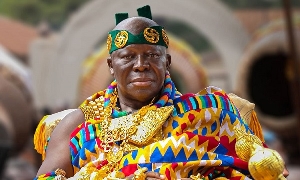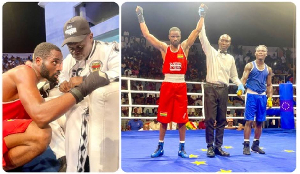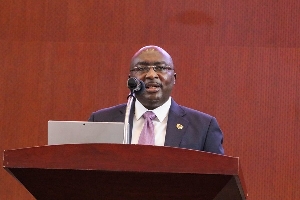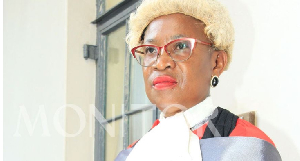Music of Sunday, 21 October 2007
Source: ghanamusic.com
From Osibisa to highlife…through “burger” to hiplife (1)
Ghana began its celebration of 50th years of Independence with a burst of initial musical activities that included a panorama of all the varieties of Ghana’s highlife music.
These musical activities (mainly co-ordinated by the governmental Ghana@50 Secretariat run by Dr. Charles Wereko-Brobby) began in January with festivals in all of Ghana’s ten regions of religious choral music, followed by local gospel music that involved over a thousand singers, including top names like Josh Laryea, Bernice Ofei, Suzzy and Matt, Jude Lomotey, Grace Ashy and Akosua Agyepong.
Then in February came the ‘Kasapreku Opeimu Show’ at State House in Accra that featured hiplife artists Obrafour, Praye, Castro and Obour, with a northern Ghanaian touch being provided by the Frafra lute player King Ayisoba.
On March 3 a nationwide series of ‘Highlife to Hiplife’ concerts were held, organised by Charterhouse and MUSIGA, with the highlife of the Ramblers, Wulomei, Asabea Cropper, George Darko and Rex Omar, and the hiplife of Reggie Rockstone, Wutah, Castro and Tinny. Then came ‘The President’s Show on March 5 with the ‘classic’ dance band and guitar band highlife of Ebo Taylor, Blay Ambolley, Paapa Yankson, C.K. Mann, A.B. Crentsil and Nana Ampadu, as well as the youthful hiplife of the Mobile Boys and Obrafour.
As this event took place at the Old Polo Ground in Accra, the actual spot where Ghana’s independence was declared in 1957, David Dontor and other Ghanaian actors also re-enacted Kwame Nkrumah’s famous independence speech.
The following Independence Day was one of formal parades at Independence Square at which twenty-four Heads of State attended (including Britain’s Duke of Kent). This was followed on the March10 by a grand formal affair at Independence Square in Accra which featured the highlife stars Pat Thomas, Kojo Antwi and Jewel Ackah, the hiplifer Samini Batman and the gospel musicians Kwaku Gyasi and Ola Williams (recently deceased).
On March 21, the semi-finals of the National Brass Band Competition were held at Agona-Swedru, the Fanti heartland of Ghana’s ‘adaha’ brass-band highlife music.
This was followed on the March 23 and 25 with a gospel ‘Ghana Praise Concert’ held at Independence Square that featured the international gospel music acts of Don Moen, Israel Houghton and the Nigerian Princess Ifoma, as well as Ghana’s Noble Nketia, Naana Frimpong, Moses OK and Christiana Love.
Besides the above programs connected with the Ghana@50 Secretariat, other celebratory events also took place. Two commemorative music CD’s were launched called the ‘Kings of Highlife’ and ‘The Best of Ghanaian Highlife Music ’ released by Metro TV and the One Touch telephone company respectively.
On the 24th February the BAPMAF Highlife-Music Institute was opened to the public at the Bokoor House premises of John Collins in South Ofankor, Accra. On the 5th March the University of Ghana organised a ‘Nite of Our Heritage’ at Mensah Sarbah Hall that included the speakers K.B Asante and Professor John Collins, and the musicians Nene and Afi. On Independence Day (March 6th) Ghana’s reggae star Rocky Dawuni performed at an Independence Sunsplash to a huge crowd a La Beach.
Then in April the Goethe Institute in Accra put on workshops, lectures and shows called ‘Made in Germany’ celebrating ‘burgher highlife’ and other musical connections between Ghana and Germany.
The same month the University of Ghana put on a ‘Time For Highlife’ shows at the Legon Great Hall that featured Ambolley, Jewel Ackah, C.K. Mann, the Ramblers, the Local Dimension palmwine band and Ebo Taylor and the University Highlife Band.
There have also been musical celebrations abroad and one I will mention here, is a musical exhibition currently going on in the UK this October that myself and the BAPMAF Highlife Institute helped curate. This is a Ghana 50 Music Heritage Exhibition at the Greenwich Heritage Centre in London from 6th.-31st October organised by the African Image Alliance.
But let us turn here to the story of Ghanaian highlife, which goes way back to the late 19th century when foreign music styles came to Ghanaian sea-ports. The regimental brass-band music of European and West Indian soldiers, the dance-music of ballroom and ragtime orchestras, the hymns of Christian missionaries, the guitar songs of seamen and the musical comedies of American vaudeville and British music-hall.
These imported performance styles were gradually Africanised from the late 19th century, which resulted in ‘adaha’ and ‘konkoma’ marching-band music, the Fanti ‘osibisaaba’ guitar music of the Fanti Coast, the ‘odonson’ and ‘palmwine’ guitar styles of the rural areas, the ‘highlife’ (i.e. high-class life) music of elite Ghanaian ballroom orchestras of the 1920’s and the indigenised theatrical ‘concert parties’ of Bob Johnson and the Axim Trio .
Popular entertainers support the early independence movement
The catalyst that sped up Ghana’s move to independence was the Second War during which time 60,000 Ghanaians saw some sort of military service.
There were also large numbers of British and American. soldiers stationed in Ghana and it was their ‘swing’ style of jazz that influenced local musicians like E.T. Mensah, Guy Warren, Tommy Grippman and the other members of the Tempos band , whose brilliant blend of highlife and swing became the iconic sound symbol in Ghana and Africa for the optimistic early independence era.
Many Ghanaian popular entertainers openly supported Nkrumah’s CPP and were influenced by its ‘African personality’ and Pan-African ideals.
The Tempos played at CPP rallies and concert parties, the Axim Trio and Bob Ansah’s concert parties staged pro-Nkrumah musical plays. Bob Vans actually changed the name of his Burma Trio to the Ghana Trio in 1948, the very year of the Christiansborg shooting of protesting ex-servicemen and the consequent boycott of European shops.
In 1952 the highlife guitarist E.K. Nyame formed his Akan Trio and released highlife records in support of Nkrumah, as did other contemporary guitar band and concert party artists, such as those of Kwaa Mensah, I.E. Mason, Bob Cole and Onyina.
As a quid pro quo for their support, when Ghana became independent in 1957, Nkrumah set up government sponsored highlife bands and concert parties attached to the Workers Brigades, state hotels and other governmental agencies, whilst private bands like E.K.’s and the Uhuru dance-band accompanied him on official trips abroad.
Nkrumah also encouraged the formation of popular performance unions, established the State Film Corporation that made films like the `Band Series’ (featuring the Tempos, Ramblers and Black Beats), and encouraged the broadcasting of popular songs and plays on state radio.
Besides its role in the independence struggle, another reason why Nkrumah’s vision included a role for highlife performance in nation building was that it is a trans-ethnic creation of the Akan, Ga and Ewe people of Ghana - and so was a particularly useful medium for projecting ‘non-tribal’ national sentiments.
Soul and ‘Afro’ fusion music late 1960’ and 70’s
Although Nkrumah was overthrown in 1966 his Pan African and ‘black consciousness’ ideals continued to thrive in the popular music sphere.
Indeed, they were enhanced due to the Afro-centric sentiments introduced to Ghana by the soul and reggae artists who came to the fore after the civil-rights marches in the United States and independence in the Caribbean..
Some even visited Ghana in the early seventies; such as Wilson Pickett, Ike and Tina Turner, Roberta Flack and Jimmy Cliff. With their ‘Black and Proud’ sentiments, ‘Afro’ fashions, and rastafarian reggae ‘back-to-Africa’ ’ message, there was a creative music explosion in Ghana (and other parts of Africa) during in the 1970’s when young artists blended together imported and local music into various ‘Afro-pop’ music styles.
The Afro-beat of the Nigerian highlife musicians Fela Anikulapo Kuti and Orlando Julius, the ‘Afro-rock’ of Ghanaian bands, Osibisa, Boombaya and Hedzolleh Soundz, and from the end of the seventies the local reggae of Kwadwo Antwi, Kente, Felix Bell and more recently Rocky Dawuni.
Highpoint of Ghana music scene - and its collapse in late 1970’S/1980’S
By the early seventies Ghana boasted over seventy highlife guitar/concert bands, scores of private or state run highlife dance-bands and literally hundreds of pop and Afro-rock/beat bands linked to schoolboy ‘pop chain’ competitions.
Catering for these were four recording studios, numerous dancing night-clubs (60 in Accra alone), and two local pressing plants (Ambassador Records and the Record Manufacturers of Ghana) that produced hundreds of thousands of records a year. Furthermore, during the early seventies two musical films were produced by Ghana Film Industry Corporation: `I Told You So’ starring Bob Cole and the African Brothers band, and `Doing Their Thing’ starring the singer Charlotte Dada.
From the mid-70’s there was also the introduction of long-running television concert parties series, such as ‘Osofo Dadzie’ and later ‘Obra’. This high point ended in the late 1970’s with the general collapse of the Ghanaian economy that began towards the end of the Acheampong/Akufo military (‘kalabule’) regime.
This was followed by a period of political instability (two military coups by J. J. Rawlings in 1979 and 1981), a two-and-a half year night curfew (1982-4) and the imposition of luxury taxes (160%) on imported musical instruments. As a result, the music industry slumped, live bands collapsed and many Ghanaian artists left the country.
Other factors of a technological nature also helped in the decline of live music bands. One was the appearance of cheap-to-operate mobile discos or ’spinners’ in the late 1970’s that gradually took over the dance floors. Moreover, it was during the 1980’s that cheap-to-produce local video productions began in Ghana and these, like the ‘spinners’, went mobile and so gradually eclipsed concert parties in the rural and provincial areas.
However, from the late 1980’s Ghana’s economy was liberalised and the country gradually began to move towards civilian rule. But by then, many of the old-time ‘classic’ highlife bands and concert parties had been inadvertently wiped out.
Nevertheless, liberalisation had a positive effect on the music industry, as it led too the de-regulation of the airwaves from the mid-1990’s when there was a proliferation of private radio and TV stations which broadcast both live performances and music-videos. Liberalisation also encouraged foreign tourism and special festivals were established in the 1990’s to cater for them, such as PANAFEST and Emancipation Day.
Also since the 1980’s there has been the introduction of relatively cheap miniaturized and digital technologies which has led to scores of new recording and video studios springing up.
Despite the collapse of live popular entertainment during the late seventies and eighties, three new musical entertainment genres have emerged. One is related to imported techno-pop styles (like disco and rap), the second is local church gospel music, and the third is ‘folklorised’ performance encouraged by tourism. Each will be discussed in detail.










